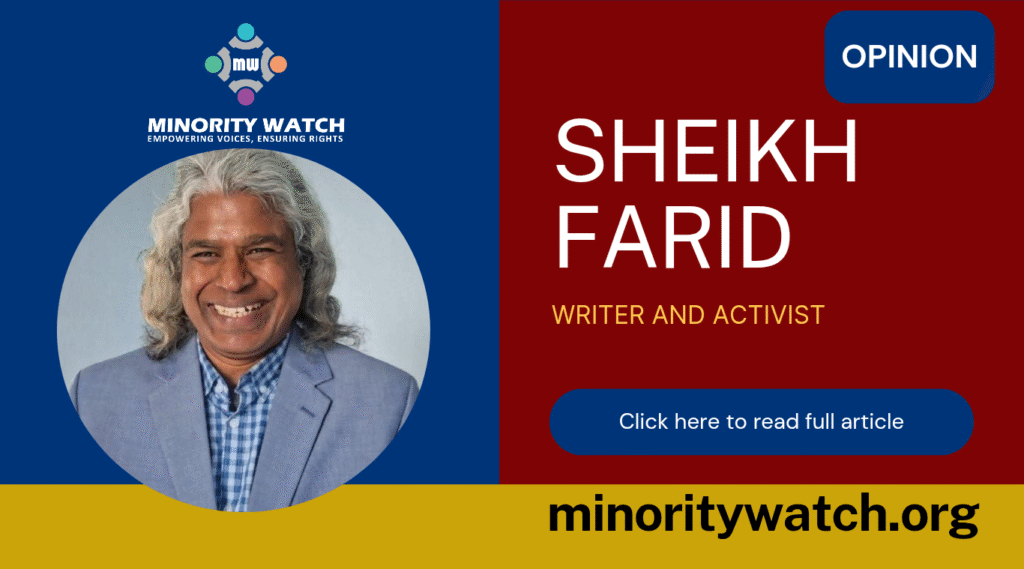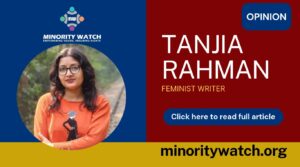There’s a proverb: if you want to know the condition of a village, observe its children. That will tell you everything. So, how are the minorities in Bangladesh doing? And why am I specifically using the phrase “Bangladesh’s minorities”? Because minorities are not necessarily oppressed in every country.
For instance, when Saddam Hussein was in power in Iraq, Sunni Muslims were a minority—but Saddam, a Sunni, was in charge. The majority Shia Muslims were not in power. In Israel, Muslims are a minority, yet they are not persecuted or oppressed. Why? Because Israel is a democracy. The presence and practice of democracy ensure that minorities are not subjected to abuse. In contrast, take Islamic Pakistan: Punjabis are technically a minority in terms of population and area, yet they dominate all aspects of the state—power, business, jobs. Even Balochistan, the largest province by size and rich in resources, remains deprived. Baloch people—despite being Muslim and often the majority in their region—have been oppressed for 75 years!
So I ask again: how are Bangladesh’s Sanatan (Hindu) religious minorities doing—especially their women and children?
Why am I specifying women and children? Because minorities in Bangladesh suffer in many ways. The largest minority group in Bangladesh today is not just Hindus, but atheists from Muslim families and lesbian women. These two groups are the most vulnerable. When they are in trouble, they find no support—not from any organization, nor society, constitution, or state. Often, even their own families abandon them.
Aside from this, there are many linguistic and ethnic minorities in Bangladesh—Christians, Buddhists, Ahmadis, and others. But today I’m talking specifically about the Hindu community and their women and children.
A 14-year-old Hindu girl once told me that she used to take private lessons from a female school teacher. One day, she needed to use the bathroom, and the teacher said, “I don’t allow Hindus to urinate in my house.” Can you imagine? A teacher said this!
But there are even more horrifying stories. Every minority child in Bangladesh grows up hearing a particular slur—again and again. Even after growing up, they still hear it. That slur is widely used in Bangladesh: “malaun-er baccha”—meaning “offspring of the cursed.” A minority child is born and dies hearing this phrase from the majority Muslim population.
It would be rare to find a Hindu child, woman, or man in Bangladesh who has never heard this slur. Who uses this term? Is it just madrasa clerics and their students? No. From uneducated village farmers, laborers, and youth—to educated Muslims, government officials, bureaucrats, even members of parliament—they all use the term “malaun-er baccha” openly and shamelessly.
I myself have witnessed a university professor using this phrase toward Hindus. Hindu students and friends hear this slur regularly. Their Muslim classmates often say it jokingly—“You malaun-er baccha!” The Hindu friend, being a minority, is forced to laugh it off. But when a Muslim calls a Hindu “malaun-er baccha”, do they understand the pain it causes? Of course, they do. They say it knowing full well how much it hurts.
This slur originates from the religious ideology and doctrines of the Muslim community. They refuse to recognize it as a crime. Or worse, they treat it as their right to use it. If a Hindu dares to respond, not just the individual—but the entire Hindu community will face backlash. Their homes will be burned, and their women will be raped without hesitation.
Some may wonder: why am I focusing so much on this one slur instead of talking about land grabbing, temple demolitions, or idol vandalism? Let me give an example.
Several families I know personally have migrated from Mymensingh to India. When I asked each of them how they were doing in India, every single one said: “No matter how I live here, at least no one calls me malaun-er baccha.” Many of them had tears in their eyes when they said this.
Muslims in Bangladesh who casually hurl this slur don’t realize that for Hindus, it pierces like a dagger. It’s like throwing stones into a frog’s mouth—amusing to the thrower but fatal to the frog.
Would you dare to call someone malaun-er baccha in India? You wouldn’t. That’s why I ask: how are Hindu minorities in Bangladesh really doing?
There’s another proverb: just one grain of rice tells you how the whole pot is cooking. By bringing this slur to the forefront, I’m highlighting the tragic condition of Bangladesh’s Hindu minorities.
Temple destruction, idol vandalism, land grabbing—those are old stories. Now, when we hear of an idol being broken, we know Puja must be near—just like we know Ramadan is approaching when prices of onions and lentils spike.
There was genocide against Hindus in 1947, and again in 1971. Those are old stories too. The million-dollar question is: under which government in Bangladesh have Hindu minorities not faced oppression? Under which regime were temples and Hindu homes not looted or burned?
And now, under the so-called Nobel Laureate Yunus-led government, persecution has escalated further. For the last twenty years, false accusations of blasphemy against Islam, the Qur’an, or Prophet Muhammad have led to hundreds of attacks on minorities—beatings, jailings, and even killings. Secular bloggers, atheists, and freethinkers have faced similar fates.
Using the excuse of blasphemy, Hindu homes have been attacked. This is a new tactic to wipe out Hindus from Bangladesh.
Moreover, many Muslims eagerly look for opportunities to feed beef to a Hindu. And beyond forced conversions to Islam—often at knife-point—many Christian missionaries in Bangladesh target Hindus for conversion. I’ve seen this firsthand in my district, Jamalpur. Ninety-five percent of the people converted to Christianity by missionaries are from Hindu backgrounds.
Bangladeshi Muslims don’t stop at calling Hindus malaun-er baccha. They think about when they’ll get a chance to feed them beef. Muslim children are taught to say kalema to their Hindu peers, hoping to convert them. And grown Muslim men dream of marrying Hindu women to make them Muslim. Many believe that if they manage to convert a Hindu, they and their 14 generations will enter paradise—no matter their sins.
Here are some real-life examples of Hindu hatred:
I was overseeing operations at a government office. A Hindu man had converted to Islam and married a Muslim woman. He distributed sweets in celebration. One Muslim employee refused the sweets. I assumed he was diabetic. But then he said: “Good that you didn’t eat them. That woman has no shame—married a malaun. If she were my daughter, I’d bury her alive. And I’d slaughter that malaun.” I was shocked. I said, “But the man is now Muslim!” He replied, “Is there a shortage of Muslim men in Bangladesh? Why sleep with a Hindu?”
During a local union election, I saw a Hindu candidate from the ruling party being publicly told not to be voted for—simply because he was Hindu. Even imams were used to preach this from the mosque.
Just as you can judge a village by its children’s condition, a modern state can be judged by how it treats its women and minorities.
Another example:
An educated friend of mine, with an MA from Dhaka University, once visited me. I lived in a house where the upper floor was rented to a Hindu family. When he found out, he cursed my landlord, saying, “Shame on him—renting to Hindus!” His wife agreed with even more vulgar language. Yet both he and his wife drink alcohol regularly—and had even offered me drinks before.
Now let me tell you something strange. I’ve heard at least ten Bangladeshi Muslims say that in India, “everything smells Hindu.” Yet India has 250 million Muslims. This is a psychological illness. You might think education could cure it—but the people I’m referring to are highly educated. Some have lived in Singapore or Europe for over a decade. Still, the communal mindset engraved in childhood never left them.
When I was a teenager, many of my close friends were Hindu. We went to the Puja fairs together. Even my conservative Muslim mother would scold me if I didn’t take my sisters to see the idols.
There were two temples near our home. We lifted our younger sisters on our shoulders so they could see the idols better. And the fairs were filled with Muslims—probably 70%. Many even participated in the rituals.
Today, such things are unimaginable.
Now, Muslim children are taught that having Hindu friends is sinful. They don’t think it’s sinful to grab Hindu land, rape Hindu women, or destroy temples and idols. In fact, they consider it a religious duty!
Forty years ago, there was still some communal harmony. During Eid, Hindus would visit Muslim homes. During Puja, Muslims would go to Hindu homes. Almost every major business had a Hindu cashier or manager. Today, you won’t see that.
Muslim students now study in Hindu-established schools under Hindu teachers—yet grow up filled with Hindu hatred. This was all deliberately designed. Education and environment are supposed to make people humane and inclusive. But in Bangladesh, the opposite is true.
Today’s Muslim majority population is far more communal and anti-Hindu than they were in the 1980s or 1990s.
You’d be surprised to know that Bangladeshi Muslims living in the US, Canada, Europe, and Australia want to drive Hindus out of Bangladesh. They don’t just say it privately—they write it openly on Facebook, from their real accounts, not fakes. And those who don’t write, say it in family gatherings and private conversations.
This hatred is political and economic—born out of losing in the race for education, jobs, and business. And there are national and international conspiracies too. Most notably, mosque imams and madrasa teachers are at the forefront of spreading this hate. The Islamic religious texts fuel this hatred, without a doubt.
Another key reason for Hindu hatred in Bangladesh is the fact that most Hindus supported the liberation war in 1971. Though ironically, even many pro-liberation Muslims now harbor hatred toward Hindus.
And from this Hindu hatred, the ‘boycott India’ and ‘hate India’ narratives were born.
Author: Sheikh Farid
Writer and Activist
Date: June 30, 2025
এই আর্টিকেলটি বাংলায় পড়তে চাইলে এখানে ক্লিক করুন
Read more news in this category
[The opinions published in MinorityWatch belong solely to the author]






